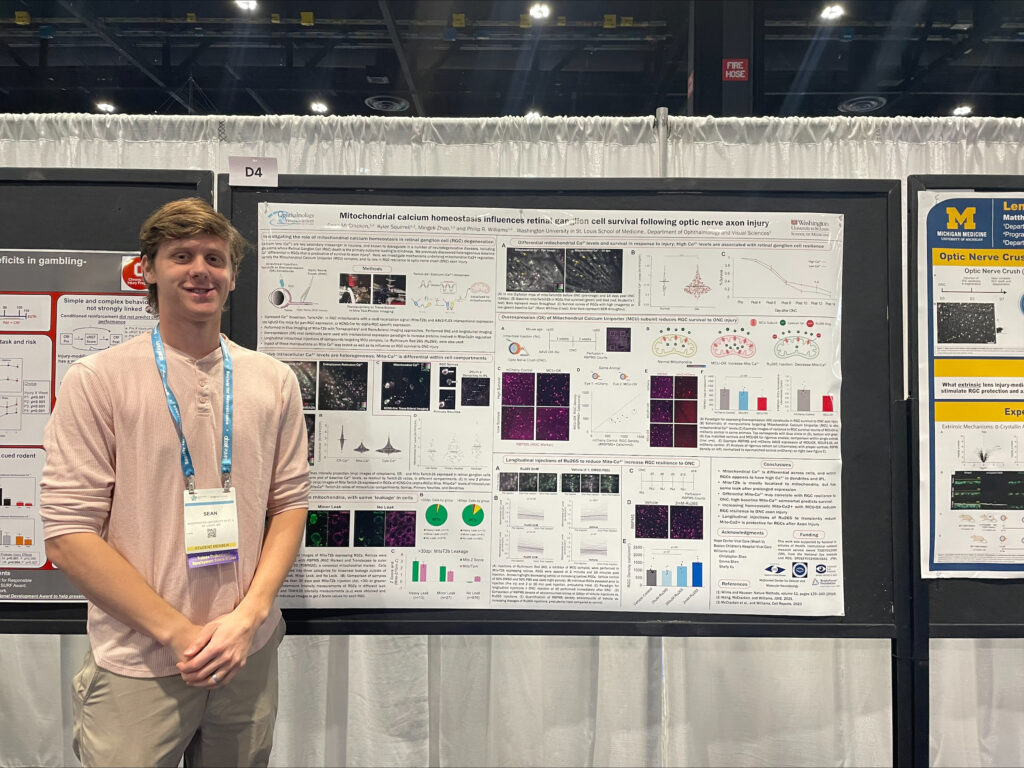The 2024 Society for Neuroscience (SfN) conference has wrapped up, and WashU Medicine Ophthalmology and Visual Sciences made a big impact by sharing groundbreaking research. From retinal degeneration to new gene therapies, WashU researchers are at the forefront of vision science. Here’s a look at the exciting posters our team presented and the promising developments they revealed for the future of eye health.
Monday, October 7:
Mitochondrial calcium homeostasis and retinal ganglion cell survival
Presenter: Sean McCracken | Williams Lab
Time: 8a–12p
The first presentation kicks off with a critical look at how mitochondrial calcium balance affects retinal ganglion cell survival following optic nerve axon injury. This research could have significant implications for neurodegenerative diseases like glaucoma.
Tuesday, October 8:
Genome-wide in vivo CRISPR-screen for neuroprotective targets
Presenter: Ning Shen | Kerschensteiner Lab
Time: 8a–12p
CRISPR technology is revolutionizing medicine, and this study focuses on identifying neuroprotective targets in retinal degeneration using an in vivo CRISPR-screen. These findings have the potential to lead to novel therapeutic approaches for degenerative retinal diseases.
Zebrafish model for age-related macular degeneration (AMD)
Presenter: Tugce Turer | Yoshimatsu Lab
Time: 8a–12p
Zebrafish have emerged as a valuable model in studying retinal disorders. This research sheds light on the metabolic activity in the retina and age-related macular degeneration, a leading cause of vision loss in the aging population.
Tuning properties of pupillary light responses
Presenter: Xiayinfang Song | Kerschensteiner Lab
Time: 1p–5p
Understanding how the eye’s pupil responds to light and contrast can offer insights into neural processes. This study examines the emergence of tuning properties in both the retina and the olivary pretectal nucleus, providing a deeper understanding of sensory processing in the eye.
Wednesday, October 9:
Developmental expression of key genes in the zebrafish retina
Presenter: Cindy Olmos | Yoshimatsu Lab
Time: 8a–12p
Exploring gene expression during retinal development, this poster discusses the roles of Vax2 and Cyp26a1/c1 in zebrafish. These findings could have implications for understanding retinal development in humans and improving treatments for developmental disorders.
Gene augmentation therapy for CRX-associated retinal diseases
Presenter: Chi Sun | Chen Lab
Time: 8a–12p
This research delves into gene therapy for CRX-associated inherited retinal diseases. Gene augmentation represents an innovative approach to treating conditions that were once thought to be untreatable, giving hope to individuals suffering from genetic eye disorders.
The Future of Vision Science at WashU Medicine
These poster presentations highlight the depth of research at WashU Medicine Ophthalmology and Visual Sciences. From cutting-edge genetic research to understanding fundamental neural processes in the eye, WashU Medicine researchers are at the forefront of discoveries that could change the landscape of vision care.




